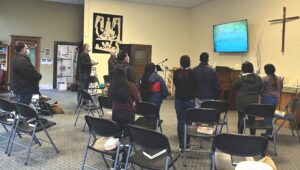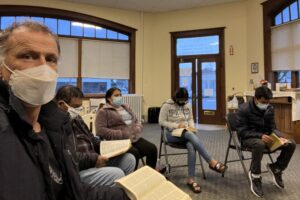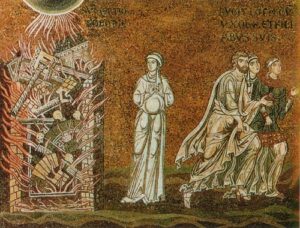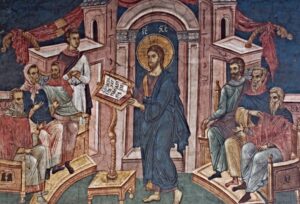|
Elevating the lowly
 Last Sunday we had a breakthrough day as we started a new Spanish Worship service (3-4:15pm). Ten people showed up, all farmworkers who’ve worked the harvests here in the Skagit Valley for many years. We worshipped using the flat screen TV and Spanish Youtube worship songs, followed by a Bible study, prayer and communion.
Last Sunday we had a breakthrough day as we started a new Spanish Worship service (3-4:15pm). Ten people showed up, all farmworkers who’ve worked the harvests here in the Skagit Valley for many years. We worshipped using the flat screen TV and Spanish Youtube worship songs, followed by a Bible study, prayer and communion.
We read and discussed together Luke 8:40-56, the story of Jesus healing a woman who’d bled for twelve years and raising from the dead the synagogue official Jairus’ twelve-year-old daughter.
In this story the synagogue official Jairus, falls at Jesus’ feet, and publicly begs him to come to his house as his twelve year old daughter was dying. Since there were a few youth and young women present, I asked if anyone there was by any chance twelve years old. One of the fathers raised his hand, pointing to his twelve-year-old daughter, who he told us had chronic leg pain. The girl shyly looked up and nodded, and we continued reading.
In the story Jesus heads off to Jairus’ house, crowds pressing in against him. A woman suffering from twelve years of bleeding approaches him secretly from behind, touching the fringe of his cloak. Direct, even secret contact with Jesus brings immediate healing. We read how Jesus stops, publicly asking: “who touched me?” The woman comes trembling, falls down before him, and tells why she’d touched him and how she was immediately healed.
There before the crowd Jesus lifts her shame, publicly crediting her faith for the healing: “Daughter, your faith has made you well; go in peace” (Lk 8:48).
The contrast between the more powerful synagogue official Jairus, who falls at Jesus’ feet begging for help versus the lowly woman’s falling before him, already healed but “caught” (or discovered) is not lost on our farmworker friends. I suspect they were moved by the woman’s immediate healing despite her “illegal” act of touching Jesus, making him impure due to her blood flow, and him calling her “daughter.” But I cannot see the expressions on their faces due to everyone being masked.
I hope that Jesus’ stopping for the unnamed woman, giving her voice and affirming her faith before the crowd and us as readers today brings them hope. Farmworkers are used to being in the lowly and vulnerable position before those more powerful: their children’s teachers, employers, physicians, law-enforcers, ministries, pastors and priests, judges, and landlords.
They experience public shame before the powers and the public when they cannot speak English, lack understanding about how our systems work, or need to stand up for their rights. I can tell that Jesus is getting through to them by their eagerness to volunteer to read the next verses, which describe the fate of the more powerful Jairus’ twelve-year-old daughter.
We read about how someone came from the synagogue official’s house to tell him: “Your daughter has died; do not trouble the teacher anymore.” The shame around “troubling” the teacher with a request, especially now that it’s too late is upsetting. Will Jesus prefer the powerless woman and leave the request of the more powerful unanswered? What will he do?
Jesus moves quickly. “Do not be afraid any longer. Only believe. and she will be made well” (Lk 8:51), he says, for all to hear.
Though there’s no sign that the official believes, Jesus goes to the house. He publicly minimizes the girl’s condition and whatever he would do next by saying: “stop weeping, for she has not died but is asleep.” Then he doesn’t respond when the mourners mock him. Jesus next only allows three of his disciples and the girl’s parents to enter the room where the dead girl lies. We too are allowed in, to see what Jesus will do in private.
Jesus takes her by the hand, in contrast to the woman who touches the fringe of his cloak. He calls (phoneo) to her- and the Greek word means “to cry out or shout”– possibly giving the impression to mourners overhearing that he’s “waking her up.” He says to her “child, arise!”
The girl’s spirit returns and she gets up immediately. Jesus gives orders to give her something to eat. The parents are amazed. The story ends with Jesus instructing them all to tell no one what had happened.
The humility and tenderness of Jesus towards Jairus and his twelve-year old daughter is so moving. In publicly minimizing the gravity of the girl’s condition, ignoring mockery, and ordering witnesses to tell no one what happened, he’s taking all attention off himself as the hero. This effectively sets the stage for the elevation of Jairus’ status as synagogue official and father.
Jesus’ secretive resurrection of the girl could be seen by his community as the direct result of Jairus “not fearing but believing.” Jesus doesn’t take the place of the girl’s father as he doesn’t call her “daughter” as he had done with the woman. And Jesus’ discretion protects the young girl’s privacy.
It’s so beautiful to see how brilliantly Luke describes Jesus’ dignifying elevation of lowly people defeated and shamed by suffering and death. Jesus continues his mission now and welcomes our participation, not wanting us to remain as onlookers.
As I wrap up the Bible study, I ask if anyone wants prayer. Immediately the twelve-year-old girl stands and comes up to me– likely in response to something her mom and dad whispered to her in Triqui, their native language.
We gather around the girl and speak words of healing over her leg in Jesus’ name, followed by prayer for others. We then gather in a circle celebrate the Lord’s Supper together with individually-wrapped communion elements.
With hearts glowing, we say our goodbyes and prepare for our English service. There, Gracie preached on “faith by hearing,” (Galatians 3:2,5), which you’re welcome to listen to below. The parents tell me their twelve-year-old daughter hasn’t complained of any pain all week!
Check out my new podcast: Disciple! Word, Spirit, Justice, Witness here.
New Release- The Humble Divinity of Jesus in Mark’s Gospel, Vol. 2, by Daniel Bourguet
The People’s Seminary is delighted to announce that the English translation of Daniel Bourguet’s The Humble Divinity of Jesus in Mark’s Gospel, Volume 2, Chapters 10-16. This excellent book is now available for purchase here.
Daniel Bourguet’s many writings inspire me in my reading of the Bible. I believe he will inspire you too! He models an approach that is deeply contemplative and faithful to the detail of the Biblical text, inspiring faith, action and more thoughtful and prayerful reading of Scripture. Following is an excerpt from the introduction, and an excerpt from his treatment of Jesus’ healing of the woman with the issue of blood.
Introduction
“Today, the perfect humanity of Christ does not need emphasizing since so many books are devoted to the theme, and rightly so; by contrast, the divinity of Christ does seem to me less commonly treated, and this impels me to bring it to the fore, without of course in any way impugning his
perfect humanity.
If we have difficulty today perceiving the divinity of Jesus, it seems to me this is because he is humble, and in our eyes humility is incompatible with the glory of divinity. It’s certainly true that Jesus is humble, and I would say doubly so, humble in his humanity as well as in his divinity since God himself is humble. This is unacceptable to anyone who thinks that God cannot be both glorious and humble. What exactly though is glory? If the most glorious of kings is also proud, his pride tarnishes his glory and diminishes it. However, if he is humble, his humility embellishes and enhances his glory. Humility goes wonderfully with glory. To say that God is humble takes away nothing from his glory; on the contrary, it elevates and makes it still more magnificent. The perfect humility of Jesus beautifies his humanity and his divinity as well. On this basis, we mustn’t be given pause by Jesus’ humility but should rather welcome it as a quality which both hides and reveals his divinity.
Mark the contemplative
A striking feature of Mark’s gospel is its great sobriety; it’s certainly very succinct. To me, this shows that Mark had no wish to invent but wanted to hold humbly and strictly to what he had received from Peter, Paul and certain other witnesses of Christ he had met. His great sobriety also shows us that Mark had well understood that the divine-humanity of Christ is a real mystery which takes us deep into the inexpressible — in his divinity Jesus is beyond anything we could say of him. None of our human languages is able to speak of God or of the divinity of Jesus. To mitigate this deficit in our words, Mark is content to suggest, to evoke a mystery which is far beyond us but is offered to us for contemplation. The sobriety seems to me to belong to a contemplative; and it seems to me this is just Mark is, a contemplative open to the inexpressible, open and sensitive to the mystery of God. In passing on as he does the fruits of his contemplation, Mark conveys all he had been granted to perceive of the perfect divinity of Christ but without losing anything of his perfect humanity.
I find Mark interesting in that like us he had not met Jesus so, like us, depended on the witness of others and had to learn to trust them. He interests me particularly because he helps us to open ourselves to contemplate the mystery of the divine-humanity of Jesus.
How paradoxical, that Mark should contemplate Jesus though he had never seen him! It’s true though, and it’s the same for us, that to contemplate does not mean fixing our physical eyes on Christ, on his visible humanity, but our inner eyes on his invisible divinity as it is seen through his full humanity. This is a gift of the Holy Spirit.
What I am proposing, reader friend, is to pause over certain texts in Mark’s gospel, following Mark in his contemplation of the divinity of Jesus. To do so, we have particularly to accept that Mark, no more than anyone else, proves that Jesus is God. It is a fact to say that the divinity of Jesus is not demonstrable; it is not susceptible of proof by human reasoning. To believe in the divinity of Christ is a gift of the Spirit granted to faith. Our place is to receive this mystery in faith and to celebrate Christ in praises which exceed words. This was Mark’s experience, writing his gospel as an expression and even a celebration of his faith, to help us to live out our faith. He wrote to comfort a Roman community shaken in its faith. By the Holy Spirit, we in turn can be edified and strengthened in our faith thanks to this gospel” (D. Bourguet, Humble Divinity, Vol. 2, xx-xxii).
Purified by the Pure (Excerpt from “The Woman with the issue of blood,” Mark 25-34).
“Following on from what we have just said, a third detail becomes apparent with the following question: is it likely that the woman would have dared touch Jesus if he was God? Wouldn’t it have been a profanation of sorts, particularly when she was unclean? Right here, it seems to me, we can see the Holy Spirit inspired faith of this woman. Without, doubtless, being able to say so, the woman knew by the Holy Spirit that she would not soil Jesus by touching him, but, on the contrary, Jesus in his sanctity would cleanse her. This is just what happened. In biblical thinking, just as uncleanness or impurity is transmitted by contact (Lev 15:19), so too sanctity or holiness is transmitted, again by contact (Exod 29:37). Once more, only the Holy Spirit could have led this woman to act with such assurance.
“From behind”
If the woman was thinking of Jesus in terms of his divinity, the remainder of the passage takes on a new light. She mixed in with the crowd and drew near to Jesus, silently, “from behind” (5:27). This detail reveals the woman’s great respect for Jesus; respect, not that she was hiding in anyway or being hypocritical. She was acting as Moses had when he wished to see the face of God and was told that he could only look on him from behind (Exod 33:23). In the same way that Moses had seen God’s back, the woman’s behavior looks like she could only consider approaching Jesus from behind.
In the continuation, when she is challenged by Jesus, she again demonstrates her respect by prostrating herself; “she threw herself down before him,” Mark says (5:33). She acts just like the publican in the parable who, in his extreme humility, dared not lift his eyes to God (Lk 18:13). In approaching from behind and in prostrating herself, this woman was moved by the Holy Spirit not to look Jesus in the face, which is the correct attitude to adopt towards God.
All these details show us that the woman was led by the Holy Spirit below the level of consciousness, or rather “in the inaccessible depths of her soul,” as certain Fathers put it. The leading must have overcome her, but it worked not by constraint but in the gentleness of the Holy Spirit. It is truly magnificent to know that the Holy Spirit worked in this way, gently but sovereignly, in the woman’s sub-conscious mind, as, certainly, he does in ours” (D Bourguet, Humble Divinity, Vol 2, p. 39-41).
Order your copy here.
Learning righteousness when the world is upending: reflections on Isaiah 26
 Over the past two weeks I’ve been reading and discussing Isaiah 26 with individuals and groups, finding it both challenging and comforting as we seek to understand these dark times.
Over the past two weeks I’ve been reading and discussing Isaiah 26 with individuals and groups, finding it both challenging and comforting as we seek to understand these dark times.
People facing poverty, imprisonment, and other hardships find Isaiah’s radical message hopeful. Like my Honduran friend David, who reads the Bible with villagers in extreme poverty. Or a group of ten Triqui-speaking farm workers from Mexico currently unemployed, waiting out the months when there’s no field work. And our own Tierra Nueva faith community, made up of many who work hard jobs to put food on the table, plus others who are homeless, recently released from prison, out on bail, or struggling with addiction.
At each reading it seems the Spirit whispers to me, alerting me to pay close attention as these verses are highly relevant now.
Isaiah’s prophetic song expresses a notable separation evident through the chapter: Between those who trust in God and those who don’t. Between the righteous and wicked, the poor and the rich, the helpless and the powerful, the humble and the arrogant. There’s a call echoing throughout to trust in God as a refuge.
“We have a strong city; he sets up walls and ramparts for security. “Open the gates, that the righteous nation may enter, the one that remains faithful.“ The steadfast of mind you will keep in perfect peace, because he trusts in you. “Trust in the Lord forever, for in God the Lord, we have an everlasting rock” (1:1-3).
This promise of security, free passage into God’s city, and invitation to trust comforts our people, who have little else available to them: not enough money, no pension plan or job security. They desire entry into God’s refuge, and are curious and desirous of what sounds good, even if still foreign: steadfastness of mind and perfect peace. They are willing to try trusting God, without knowing exactly what this means. I want to too.
The prophet next exposes the true destiny of those the world considers above all the turmoil: powerful nations, successful organizations, billionaires, millionaires, rich politicians, corporate executives, cartel chiefs, and anyone with big salaries, amassed retirement plans and whatever people imagine brings earthly security.
“For he has brought low those who dwell on high, the unassailable city; he lays it low, he lays it low to the ground, he casts it to the dust. The foot will trample it, the feet of the afflicted, the steps of the helpless” (1:5-6).
Here the prophet Isaiah speaks about the not-yet-visible destiny of Judah’s elite at a time when they felt and looked invincible. In the face of what appeared a “high, unassailable city,” God’s judgment is announced as more real than visible reality. These words echo earlier words in Isaiah 2:12.
“For the Lord of hosts will have a day of reckoning against everyone who is proud and lofty and against everyone who is lifted up, that he may be abased.”
The prophet’s warnings were later realized when the Babylonian army attacked, destroying Jerusalem and carrying off Judah’s elite into exile. Isaiah’s prophecy continued to speak to later generations, and certainly our own.
Mary’s song celebrating Jesus’ coming birth echoes these same ominous words of judgment of the powerful and raising up of the vulnerable.
“He has done mighty deeds with his arm; he has scattered those who were proud in the thoughts of their heart. “He has brought down rulers from their thrones, and has exalted those who were humble. “He has filled the hungry with good things; and sent away the rich empty-handed” (Lk 1:51-53).
In contrast, Isaiah presents a way forward for those who put their trust in God:
“The way of the righteous is smooth; O Upright One, make the path of the righteous level. Indeed, while following the way of your judgments, O Lord, we have waited for you eagerly; your name, even your memory, is the desire of our souls. At night my soul longs for you, indeed, my spirit within me seeks you diligently; For when the earth experiences your judgments the inhabitants of the world learn righteousness” (26:7-9).
As someone who has served as a jail and prison chaplain now for over 26 years, I regularly see people who are experiencing judgment learning “righteousness,“ which I define as Spirit-guided living in alignment with Jesus’ life and teachings.
Adversity can really humble us, as we recognize our failings and need for forgiveness, freedom and restoration. The way doesn’t immediately become “smooth.” But when things are rough, we readily cry out with the prophet: “make the path of the righteous level!” We know what we’ve been doing hasn’t worked, and we are willing to be guided and to try to trust.
The prophet observes that “though the wicked (synonymous with the rich and powerful) are shown favor, they do not learn righteousness.”
Do you notice that when people’s wealth increases, and they benefit from tax breaks and business successes, that they become more merciful and justice-oriented? According to Isaiah they don’t, and we won’t either if we’re in that camp.
“He deals unjustly in the land of uprightness, and he does not perceive the majesty of the Lord. O Lord, your hand is lifted up yet they do not see it” (26:10-11).
In contrast, the righteous acknowledge their life of bondage to other dominating powers, confessing God’s name alone.
“O Lord our God, other masters besides you have ruled us; but through you alone we confess your name” (26:13).
The prophet then shifts attention again to the fate of the rich and unjust, declaring God’s coming judgment:
“The dead will not live, the departed spirits will not rise; therefore you have punished and destroyed them, and you have wiped out all remembrance of them” (26:14).
There’s no us-them militancy or pharisaic superiority here! The prophet’s own community of resisters are brutally honest, recognizing their inability to save.
“We gave birth, as it seems, only to wind. We could not accomplish deliverance for the earth.”
I read this with a deep sigh as I recognize quite regularly my own inability to save anyone.
The prophet’s subsequent confession that God alone brings salvation through raising the dead, rings so true for me now, as we lose person after person from our community to overdose deaths– despite our best efforts at pastoral care, drug and alcohol rehab, relapse prevention and re-entry approaches.
“Your dead will live; their corpses will rise. You who lie in the dust, awake and shout for joy” (26:19).
The prophet then speaks to people of faith who live between the present moment and the future victory over death by resurrection. This is the time we now live in, when God’s judgment is underway. This judgment involves an extended period of shaking, where a massive reversal is happening, which will not stop until God’s justice is established on the earth.
This reversal will shake the foundations of all visible systems, as God brings the rich and powerful down, along with every structure they’ve created to secure their power and fortunes: nations, corporations, economies, denominations…. God’s justice is underway, which will result in the raising up of the poor and needy.
During this period of upheaval the prophet offers advise that may surprise. Rather than mobilizing people to reform government, to engage in class conflict, personal defense or any kind of violent struggle, the prophet calls people into an even more intimate and personal refuge that parallels the “strong city” behind walls described at the beginning of the song.
“Come, my people, enter into your rooms and close your doors behind you; hide for a little while until indignation runs its course” (26:20).
In the Greek version of this verse, the underlying word behind “room” is tameion, meaning “innermost, hidden, secret room.” This is the same word Jesus uses in his teaching about prayer in Matthew 6:6.
“But you, when you pray, go into your inner room, close your door and pray to your Father who is in secret, and your Father who sees what is done in secret will reward you.”
The Greek version of Isaiah 26:20’s call to enter your room is word-for-word the same as Matthew 6:6, apart from the verb “shut,” which in Isaiah means “to firmly shut” (apokleio). Firmly shutting the door is urged during times of upheaval. In contrast, Jesus simply tells us to go inside and shut the door (kleio), adding that our Father is there inside awaiting us, seeing what is done in secret and ready to reward us. The Father’s presence is a stronghold.
Isaiah ends his song with words that describe a period of exposure, where injustice and crimes long covered up will be brought into plain view.
“For behold, the Lord is about to come out from his place to punish the inhabitants of the earth for their iniquity; And the earth will reveal her bloodshed and will no longer cover her slain” (26:20-21).
This is the period in which we now live, when the sins of the powerful are being brought to light. Whether that be victims of clergy, politicians (or anyone’s) sexual abuse coming forward to tell their stories, the bodies of First Nation’s children being unearthed from mass graves in Canadian residential schools, or Wiki-leaks like exposés of corruption, war atrocities, gross economic inequalities, or the disappearance of species and polar icecaps due to global warming, the movement of sacred history includes all the deeds of darkness coming into the light.
Going into our rooms and shutting the door must not be escapist. Rather it involves first a deep recognition of our worsening situation that would alert us to the need to enter our rooms. Things are only going to become more dire, and we must resist denial and false hopes.
Jesus calls us to pray to our Father there in the secret place, where our identity becomes clarified as we come to more fully know ourselves as sons and daughters in God’s family, in the Kingdom of God’s Son, Jesus Christ. There, in the secret place, we listen for words, which nurture, empower and direct our next steps, showing us our course of action, the way of righteousness, in Jesus’ liberation movement.
Run for your life and don’t look back: Reflection on Lot’s flight from Sodom
I recently revisited a notorious trauma text—the destruction of Sodom and Gomorrah according to Genesis 19. I was in search of good news in a dark and difficult Scripture, hoping it would help me find some good news here and now, in our dark USA.
For years I’ve led people in comparisons between Abraham and Sarah’s warm hospitality of strangers (who turn out to be YHWH and two angels), in contrast to the men of Sodom’s attempt to violently abuse the sojourners, and Lot’s abhorrent attempt to protect his visitors at his daughters’ expense.
On this visit to Sodom I notice for the first time comparisons between the two angel guests’ visit to Lot, and Jesus’ sending of missionary disciples in pairs to receive hospitality, heal the sick and announce the nearness of the kingdom of God (Lk 10:9).
These two messengers are sent because God says to Abraham: “The outcry of Sodom and Gomorrah is indeed great, and their sin is exceedingly grave, “I will go down now, and see if they have done entirely according to its outcry, which has come to me; and if not, I will know” (Gn 18:20-21).
The two men head down on a fact-finding mission, while Abraham stays back with God, interceding for anyone who might be counted as righteous below. The messengers experience the oppression firsthand, and their visit turns into a rescue mission for undeserving and reluctant members of the family of God.
Abraham’s intercession bears fruit, and the messenger men offer spiritually-empowered protection against predators before rushing Lot, his wife and daughters out of town before it’s destroyed. Their intervention shakes a family co-opted by an evil culture out of their spiritual stupor. They, like many in our society today, seem to have fallen prey to spiritual blindness and near paralysis.
A mob surrounds Lot’s house, calling for him to turn over his visitors so they can violate them. Lot tries in vain to reason with them, calling them “my brothers.” He offers them his virgin daughters in the place of his angel guests. The men of Sodom then turn on Lot, prompting the men (angels) to reach out their hands and bring into the house, shutting the door. They then strike the predators with blindness (19:10-11).
The men urge Lot to bring his family out the place and Lots tries to comply. He urges his family to flee the city before it’s destroyed, but his sons-in-law think he’s just joking.
When morning dawns the angels urge Lot to get out of town. “But he hesitates. So the men seize his hand and the hand of his wife and the hands of his two daughters, for the compassion of the Lord was upon him; and they bring him out, and put him outside the city” (19:16).
Today in the America where I live the story strikes me as highly relevant. So many seem entrapped by predatory powers, pulling them (and me) away from the narrow path that leads to life. God’s compassion is at work, and like Jesus who sent out the seventy, the Spirit recruits and sends out people on fact-finding and rescue missions now.
Over the past months I was prompted to go looking for a young man I knew from the jail, who I’d heard was caught up in a meth addiction and suffering from diabetes. He was living in a notorious place with other addicts and people hiding from the police. While I prayed for him, I put off looking for him, and then heard the tragic news a few weeks ago that he’d died of Covid.
I also felt compelled more recently to look for another man, and I delayed again. When I heard he’d been hit in the head with a baseball bat and was back in jail facing charges that could give him a third strike according to Washington State law, leading to a life sentence, I decided to pay him a visit in the jail. This visit went beautifully, and my friend urged me to visit that notorious place, telling me to tell the people that he’d sent me.
I have since visited the place and been well received, meeting people who are facing imminent eviction and homelessness. The story is still unfolding, so let’s return now to the outskirts of Sodom to see what happens there.
When the angels bring Lot, his wife and daughters outside one says: “Escape for your life! Do not look behind you, and do not stay anywhere in the valley; escape to the mountains, or you will be swept away” (19:17).
Lot lamely negotiates for an easier solution, but then complies. He, his wife and two daughters flee and are spared. In contrast Lot’s wife “from behind him, looked back, and she became a pillar of salt” (19:26).
The fate of Lot’s wife is brutal in its finality. There’s no turning back from becoming a pillar of salt. She looks back and it’s too late. And yet we see the urgency to flee and the finality of death far too often here in our streets and in our country today!
A woman who used to attend our services comes out of a drug and alcohol treatment program earlier this year, immediately relapses on heroine laced with fentanyl, and dies of an overdose. Someone with active warrants for minor offenses, on the run from law-enforcement, sells drugs to make some quick money to hold their family over and to post bail. They’re busted for drug dealing and now face years in prison. A Christian leader I’d written several times, attempting to challenge his overtly nationalist and anti-vaccine blog posts dies of Covid. Not escaping for your life and looking back can have fatal consequences, as Philoxenos of Mabbug, a 4th Century Christian mystic comments.
“So then, if you are following Jesus, walk behind him and do not turn back behind you. Remember the wife of Lot: because the love of her people and the sound of the howls of her friends had forced her to turn around and look behind her and she became a pillar of salt, as it was written concerning her. Because her soul did not become salty by fear of the Most High, she became a pillar of corruptible salt. Remember then this woman who was divided in her mind and perished, so do not become divided like her and do not turn around behind you lest you remain on your spot. It will be this way for you, if not in your body, at least in your soul. Whoever turns around and looks behind himself after he has departed on the journey of this road, his soul will become an unfeeling pillar. Just as the wife of Lot had ceased bodily sensation and so became a pillar of salt, so also here the thought that always looks back at corruptible things will cease and be numb to the sensation of spiritual things, because the memory of the world acquires for us the dullness of the heart and soils the clarity and purity of the soul, and this physical worry will obscure and darken the pure gaze that renders the min capable of constant vision towards God…
Therefore, depart from the world, O disciple, by that example in which the apostles had departed, in deed and not just in name, by one’s own thought and not by pretense; by will and not by outer appearance; by desire and not by chance; by discernment and not by tradition; by freedom and not by law. Daily make the desire of this spiritual way of life new in yourself. Taste life while making everything moral die from you.”
I’m trying to pay closer attention for myself, my family and for others the Holy Spirit puts on my radar. The compassion of the Lord is still at work, compelling us to seize people by the hand at times, and urging them to flee temptations and dangers.
Jesus himself was moved with compassion when he saw the crowds “distressed and dispirited like sheep without a shepherd. Then he said to His disciples, “The harvest is plentiful, but the workers are few. “Therefore beseech the Lord of the harvest to send out workers into his harvest” (Mt 9:36-38). May we not delay in our response to his recruiting and sending, and join him in his rescue missions.
Check out my Sermon last Sunday at City on a Hill Church in Surrey, British Columbia below.
Baptisms precarious & precious
 Baptisms at Tierra Nueva are momentous occasions that are celebrated by our faith community. Most of our people come out of lives deeply marked by traumas of many kinds.
Baptisms at Tierra Nueva are momentous occasions that are celebrated by our faith community. Most of our people come out of lives deeply marked by traumas of many kinds.
Addiction, homelessness, and incarceration are often part of people’s journeys. They talk of feeling worn out with life on the streets, and describe in different ways the gentle draw of Jesus’ embracing love becoming an irresistible tug.
Normally our TN pastors try to meet up 3-4 times with each person wanting baptism. Since most all are new to faith in Jesus, these times are precious encounters where people make discoveries, embracing God’s love, and confessing and turning away from evil in precise ways.
Since people are often navigating precarious life circumstances, and chaos often ensues prior to baptism, we’ve learned we must be flexible. We seek to “get away with” each meeting, like we’re stealing from the enemy camp. This means we must seize the moment as unforeseen time slots become available for each individual, rather than counting on set meeting times.
Our baptisms themselves are often quite precarious. Last Sunday morning Lorinda called me disturbed.
“Pastor Bob, we are going to have to change our baptism site. The river bank packed with fishermen, shoulder-to-shoulder. The boat launch is jammed full of trucks with boat trailers! What are we going to do?”
I could see we indeed had a problem as there’s a huge salmon run up the Skagit River right now. I imaged fishermen being frustrated with us taking up too much of the beach, and lures even hooking our new spiritually caught “fish” in their legs.
“What were we to do at such short notice?” I wondered.
Lisa, a faith community member and our new admin person jumped into action. She called her pastor friends who run Cowboy Church in the nearby community of Bow. Soon she had it arranged to have me meet her at a farm with my trailer and load up a large metal livestock drinking trough they use for baptisms—stationed outside a horse-training arena where the church meets. We set it in our garden and Julio filled it with water- just hours before our service.
The baptisms happened at our normal worship site in the garden behind Tierra Nueva—a joyous occasion! Christina reflected on her baptism:
“I feel great! Actually I feel like I’m whole, if that makes sense. I am confident in why I exist now. Before I felt like I was just a being with no direction day after day. It’s really changed me inside.”
Then a few days later, last Wednesday, Julie showed up at Tierra Nueva. She had missed the preparation meetings for her baptism, and the service last Sunday. She saw the big livestock trough still full of water and asked Julio: “Can I still be baptized?”
Since she arrived right when we were starting our street outreach, we adjusted our plans and did a Bible study on Philip’s baptizing of the Ethiopian eunuch on the desert road in Acts 8.
Julie’s request minutes before was so much like the Ethiopian’s: “What prevents me from being baptized?”
We in turn repeated Philip’s words, addressing them to her: “If you believe with all your heart you may.”
This was the perfect segue to baptism, and our group of eight gathered around and prayed for her, led her into the baptismal renunciations and affirmations. Then Julio and I baptized her then-and-there (second picture below). After she came up from the water we prayed for her back and shoulder, and she experienced immediate healing. What a beautiful time!
We value your prayers for protection and ongoing growth for our newly baptized people: Heather, Christina and Julie.
There’s still time to sign up for one of our People’s Seminary trainings. Check them out here: http://www.peoplesseminary.org
Joining Jesus as empowered guests, not hosts: Mark 6, part 2
 At Tierra Nueva over the past three weeks, 10-12 of us have been meeting on Wednesday afternoons to first learn from the Gospels what it looks like to follow Jesus in mission. We then pray together, divide up into groups of 2-3 and head out onto the streets, where we offer to pray for peace or for the needs of individuals we meet. After 45-60 minutes we come back together to debrief. Everyone returns with stories of positive encounters.
At Tierra Nueva over the past three weeks, 10-12 of us have been meeting on Wednesday afternoons to first learn from the Gospels what it looks like to follow Jesus in mission. We then pray together, divide up into groups of 2-3 and head out onto the streets, where we offer to pray for peace or for the needs of individuals we meet. After 45-60 minutes we come back together to debrief. Everyone returns with stories of positive encounters.
During a recent Bible study we see how Jesus shows that his role as prophet, or spokesperson for God, was not welcomed among his own (Mk 6). He himself could only lay his hands on a few sick people. So, he takes off for the surrounding villages, and then calls and sends the twelve disciples out in pairs to other places.
As the disciples go out with Jesus-given authority and in extreme vulnerability they witness repentance, and lots of freedom from evil spirits and healing (Mk 6:13). How could this story help us experience something similar now?
Looking more closely at Mark 6:7-13 we notice how after calling them to himself and beginning to send them out in pairs, Jesus “was giving them authority over the unclean spirits.” We note that Jesus’ first miracle was to cast out an unclean spirit from someone in the synagogue (Mk 1:23-25).
Unclean spirits are powers that afflict people who are meant to be fully filled by the Holy Spirit. These spirits are associated with undue loyalty, submission, oppression by or outright idolatry to organizations (synagogues, temple, religions), regions (Gerasene), violence (Mk 5:2), legions of the Roman Empire (Mk 5:9), etc. In the gospels they are associated with sickness, psychological torment and even permanent conditions like deafness and muteness (Mk 9:25). Unclean spirits include “religious” or nationalist spirits, as they cause people to fall down, and show their allegiance (Mk 3:11).
They are invisible powers at work everywhere in our culture and larger world, associated directly with “rulers, authorities, powers and world forces of wickedness in the heavenly places” that Paul says we struggle against— and not against “flesh and blood” (Eph 6:12).
Jesus had authority over these spirits and gives this to his disciples- you and me included. But what’s amazing is that Jesus combines this authority with the uncommon partners of extreme humility and vulnerability.
Jesus sends out his disciples without money, or extra clothes—a huge contrast to the church’s normal tendency to serve as host rather than guest. Disciples are only to carry a staff, (which is the same word in Greek as scepter). King Jesus deputizes his disciples and sends them and us outside our comfort zones as dependent guests (not conquering invaders)– to advance the Kingdom of God.
In Mark 6:7-13 we notice that there’s no more mention of the disciples exercising authority over unclean spirits. Rather they act more broadly and freely, preaching repentance, casting out demons and anointing the sick with oil and healing them. Receiving authority over unclean spirts from Jesus opens the way for the Kingdom of God to come close.
There in the Tierra Nueva garden our people were excited about the prospect of this kind of mission. Most of them had experienced hardships like homelessness, addiction, and incarceration. Some had also been on the receiving end of overly zealous Christian mission efforts. Yet they see the need for a scepter, and they like adventure.
My group consisted of Robin and her sister, who came that day for the first time. We started right off praying for one of the women new to Tierra Nueva. She drinks in the prayer and care like a thirsty plant.
We head down the road, noticing a hopped-up car parked by the park where we used to meet for Sunday worship. A big star on the hood catches our attention. A woman sat in the driver’s seek, window rolled down, talking away on her cell phone.
“Let’s pray she gets off the phone quick or we won’t be able to pray for her,” I propose. We pray and she almost immediately ends her call. We approach her and describe our mission, offering to pray.
“Yes, I’d like prayer,” she says. “I want protection from Covid.”
We gathered around her window and each of us pray. We share how we noticed the star, and tell her we believe God sees her as a precious person, a shining star like the one on the grill of her car.
Tears begin to fall, and her eye lashes start to come unglued. She didn’t seem to notice as she soaks up our words and prayers.
We leave her and meet a young man with pierced nose and lips, and a skateboard, who’s waiting for a bus. He, too, gladly receives prayer for his wife and new baby daughter, born two days before.
We return to the garden and hear reports from the three other teams, who had each prayed for 4-6 people.
The following week we head out together again, crossing the street as a group before going our separate ways as small teams.
Together we run straight into a young man we knew from past interactions. He was pushing a shopping cart along with a blanket and other basic necessities he’d acquired. We ask how he’s doing and if he needs prayer. One of our people knew he had just lost his stepmother to a Fentanyl overdose. He is deeply touched as we gather around him and pray. Gracie and Jessica accompany him back to our Tierra Nueva garden, where he waits until we return, to get a ride to the place he’s staying in Sedro Woolley.
Roger, one of our team members, had received an image of someone wearing red while praying two days before. I tell him I have a strong sense we need to head to a particular corner near the police station. Off we go, walking several blocks. We decide to stop by a local clean and sober house, and pray for two men out front, one of whom we knew from the jail. We turn the corner, and pass a Mexican woman and her son working in the yard. She is eager to receive prayer, especially for one of her older sons, who suffers from diabetes. We pray for his healing, and invite her to join us in our prayer walk the following week.
Suddenly Roger nudges me. “Bob, we’ve got to cross the street!” He points to a man with a dark beard fixing his bicycle on the corner—the very corner I had envisioned. Roger notices his red shorts, fitting the description of the guys in his vision.
We cross the street and approach him, and Roger humbly shares how we are out blessing the community, walking the streets and offering to pray for people. “Can we pray for you for anything?” he asks.
The man looks at us in shock. For the longest time he is unable to speak- his lips quivering and face contorting. He asks us to pray for his five-year-old daughter, from whom he was legally separated for some reason unknown to us. This separation is crushing him. Her name is tattooed on his forearm. He cries as we pray, and then shares how he works at a motel, and everyone he knows is struggling with Meth. He asks us to pray for his friends. When he learns I’m a pastor, he gives me a big hug. He knew about Tierra Nueva and says he needs a family, a faith community. He gives us his number and takes ours.
We return to the group in the garden, where everyone shares their stories. Julio, Lucrecia and Chucky had prayed for a woman with Cancer. Jessica and Gracie and stopped by someone from Jessica’s work and prayed for her.
Like Jesus’ disciples who talk with people, cast out demons and pray for healing after Jesus gave them authority over unclean spirits—it seems we are stepping into a version of this ministry. We can see that our simple stopping, conversing with and praying for people affected by Covid, Cancer, Fentanyl, the court system makes a difference for them– without needing money or anything material to give. I’m excited to go out again. May the Spirit fill and empower you to step into Jesus’ ministry too.
Facing Our Shattered State
 I was struck by the relevancy today of Isaiah’s prophetic words to God’s people prior to the destruction of the nation of Israel and their exile in 587 BC.
I was struck by the relevancy today of Isaiah’s prophetic words to God’s people prior to the destruction of the nation of Israel and their exile in 587 BC.
“Be broken, O peoples, and be shattered; and give ear, all remote places of the earth. Gird yourselves, yet be shattered. Gird yourselves, yet be shattered. Devise a plan, but it will be thwarted. State a proposal, but it will not stand. For God is with us” (Isaiah 8:9-10).
This is the situation here in North America. Our Western societies are in rapid decline: greed, corruption, depravity, bitterness, and division abound.
We need to be shattered to the point of authentic humility, because our not-yet-shattered state is bringing chaos at nearly every level. Baptismal death is necessary for resurrection life to emerge out of the rubble.
The United States and its Western allies continue to harvest bitter fruit from their latest efforts at nation-building: Iraq and Afghanistan. People’s belief in military might and expertise has been exposed as futile and pathetic. The United States’ self-interested foreign interventions are not only visibly ineffective, but bring division, corruption, death, and destruction. This is becoming more obvious from day-to-day, as lives continue to be lost and chaos ensues in Afghanistan. The world is seeing so clearly that America is an impotent, false savior.
The rapid victory of the Taliban in Afghanistan this month, despite the US military’s spending of $83 billion and 20 years of training and equipping the Afghan army (under Republican and Democratic-led administrations), exposes the US and its allies’ incapacity and bankruptcy (see Rachel Tecott’s article “Why America Can’t Build Allied Armies,” Foreign Affairs, Aug 26, 2021).
The failure of the president of Afghanistan, Ashraf Ghani to effectively rebuild and govern exposes the failings of Western education, expertise, strategy, and US backing. Dr. Ghani held a PhD from Columbia University and wrote the book, Fixing Failed States: Rebuilding a Fractured World.
America’s domestic situation continues in disarray, reflecting how money and education are also incapable of rebuilding our fractured nation. The United States’ most prosperous cities (Seattle, San Francisco, Los Angeles) are filled with homeless encampments. The Seattle area is home to many Fortune-500 companies, including Amazon, Starbucks, Nordstrom, Weyerhaeuser, Expeditors, Costco, Alaska Airlines, as well as giants like Microsoft, Expedia and Boeing. Business and technical competence and wealth abound, yet the downtown to the peripheries are filled with people visibly struggling with homelessness, addictions, poverty and mental health disorders. In major cities across the USA there are myriads of visible, daily reminders of the failure of our nation to effectively care for its own. Added to this are the continuing Covid and opioid epidemics, and the ongoing reality of mass incarceration. What will it take for people to finally acknowledge our broken, shattered state?
Democracy in the United States is in crisis, with partisan division paralyzing effective decision making. Racial divisions, and the scapegoating of immigrants and refugees and general unrest are on the rise. Climate change is wreaking havoc, with storms and forest fires abounding. Increasingly, free enterprise in the name of freedom creates a culture where raw and perverse porn is rampant, violent media, and disinformation abound. Distortion, denial and outright lies are marketed as truth, and swallowed whole by naïve partisan consumers.
“Be shattered, for God is with us!” writes Isaiah prior to Israel’s destruction by the Babylonians and consequent exile. Not a normal message of comfort and love, but a call to extreme humility.
Isaiah’s message is extreme realism. We must honestly face our personal and corporate incapacity, bankruptcy and brokenness, and God is with us as we do this. But this means breaking with those who are stuck in denial, self-justification and blaming.
“For thus the Lord spoke to me with mighty power and instructed me not to walk in the way of this people,” continues Isaiah (Is 8:11).
What does it look like today for followers of Jesus to “not walk in the way of this people?”
May each of us humbly and prayerfully consider this question. Isaiah continues to wax eloquent:
“You are not to say, ‘it is a conspiracy!’ with regard to all that this people call a conspiracy, and you are not to fear what they fear or be in dread of it. It is the Lord of hosts whom you should regard as holy” (Is 8:12-13).
Isaiah calls God’s people away from fear, and from false narratives and idolatry. Wholesale allegiance to God is the simple, radical and only way forward.
False prophets are calling for Christians to arise and get politically involved, making our government this way or that way, before it is too late. It is already too late, and government reform is important but will not solve our biggest problems. As Isaiah states: “Devise a plan, but it will be thwarted. State a proposal, but it will not stand.”
Making America or any nation great again is not the way of Jesus, and Jesus himself certainly did not promote the Roman Empire or support Israelite nationalism. Jesus-followers are called to announce the “Gospel of the kingdom”— a “kingdom not of this world,” though fully “in the world.”
“And he (God) you shall fear, and he shall be your dread. Then he shall be a sanctuary, not to the houses of Israel, a stone to strike and a rock to stumble over, and a snare and a trap for the inhabitants of Jerusalem.”
John the Baptist was another prophet who prepared the way of the Lord, who showed up in Jesus of Nazareth- a stumbling block for many. John preached a “baptism of repentance for the forgiveness of sins” (Mk 1:4). People came to him, confessing their sins.
Immersion in the waters of the Jordan represents death to the old self, and cleansing from sin. Coming up out of the baptismal waters is a restart- a new beginning, free from their old allegiances. There’s a new availability to receive the Holy Spirit and step into true identity as a son or daughter– each one ready to begin eternal life. Many came to receive John’s baptism, but some didn’t. May we choose to die again under the waters of baptism, agreeing to “be shattered,” which is the pre-requisite to the resurrection life.
Consider joining us for a new cohort of our Certificate in Transformational Ministry at the Margins which addresses questions like these, designed for those already serving (or feeling called to pioneer work) amongst poor and marginalized communities. This 12-week CTMM 2021 Module 1 training begins Sept 28, Tuesdays 12:00-1:30pm (PDT).
https://www.peoplesseminary.org/product-page/newctmm2021
Visit our website for more information: http://www.peoplesseminary.org
Insights for prophets without honor
Reading and enacting Mark 6 with 14 young adults from France, Poland, in Hungary in Budapest at the end of July brought the public ministry of Jesus into sharp focus.
We read how Jesus taught in his hometown synagogue. At first his fellow villagers were impressed, asking: “where did he get these things?” They wondered how someone ordinary, like them, could have such wisdom and perform miracles. But then they took offense.
“Isn’t this the carpenter, the son of Mary, and brother of James, and Joses, and Judas, and Simon? Are not his sisters here with us?”
Jesus then made his famous statement: “A prophet is not without honor except in his hometown and among his own relatives and in his own household” (Mk 6:4).
Since those familiar with Jesus wouldn’t honor him, they were unable to receive from him. He could only lay his hands on a few sick people and consequently could not advance the Kingdom of God among his own. Jesus was amazed at their unbelief. He expected them to humbly embrace him as a divine messenger, even though he was like them.
This text is highly relevant for followers of Jesus now, serving as a warning that if we are staying within our own insider community and limited subculture, our prophetic role will likely be challenged or stifled. If it happened to Jesus, it most certainly can and will happen to us.
In today’s Covid-struck, divided and even hostile environments, people tend to stay where they are comfortable, and where things are familiar and safe. Human beings self-segregate around national, ethnic, ideological and religious identities. In these settings Jesus-followers can find themselves unable to effectively minister to their own, and consequently can become discouraged by a lack of fruitfulness. Jesus’ teaching and action in Mark 6 speak to our times. But first let’s address a common misunderstanding.
Jesus’ words about himself as a prophet stop many of us from seeing this as relevant to ourselves. We can see that Jesus was a prophet—but what does that have to do with me? More than you might think!
Scripture is clear that every child of God is called to prophecy. Every human is made in God’s image and likeness (Gn 1:26), invited to represent the Kingdom of God through word and action.
When the Spirit of God was placed upon the 70 elders on Mount Sinai (and not just Moses), they prophesied, and when people took offense Moses said: “Would that all the Lord’s people were prophets, that the Lord would put his Spirit upon them!” (Nm 11:29).
Moses’ prophetic words were realized at Pentecost, when a tongue of fire came upon the heads of all the gathered believers, and they began speaking of the mighty deeds of God in the different languages of the assembled people (Acts 2:11).
Peter interprets Pentecost as the fulfillment of the Joel 2:28 prophecy that in the last days God would pour out the Spirit on all humankind, empowering people to have visions, dreams and to prophecy (Acts 2:17).
Paul himself urges believers to “pursue love, yet desire eagerly the spiritual gifts, especially that you may prophecy” (1 Cor 14:1).
Jesus states clearly here that a prophet (you, me) will not be honored in our homeland (patris), racial/ethnic group (sungenes), and household (oikia)— manifestations of the powers and principalities created by and for Christ (Col 1:16), which become empowered by unclean spirits when they are worshipped.
These same categories God called Abraham to take leave of so he could be a blessing to “all the families of the earth” (Gn 12:1-4). Jesus himself left his hometown to teach in the surrounding villages (Mk 6:6)– though he continued to engage with his own resistant people.
In Mark 6:7-13 Jesus sends out his twelve disciples in pairs, giving them authority over unclean spirits (which would include spirits associated with nations, cities, ethnicities, organizations, political entities, businesses, religions, idols, etc…).
After studying Mark 6 we headed to downtown Budapest, dividing up into three to four people, including a Hungarian in each group to translate. Most had never ventured onto the streets in any kind of public witness, and would find it much harder to do this in their own countries and neighborhoods than in a foreign place like Hungary. Once out on the streets in my small group the Hungarian woman translating for us made an interesting observation.
“Hungarians are not used to being approached by one another in public,” she said. “People are wary as the only ones that do this are Jehovah’s witnesses or Hare Krishnas.”
“When a foreigner approaches, Hungarians are more receptive,” she continued. “They are more curious and sometimes can even feel honored.”
From then on one of the non-Hungarians in our group was the first to speak when we approached Hungarians, even if it was in English, and this in fact seemed to work better. Many Hungarians received prayers of blessing and healing from our majority non-Hungarian teams. Immigrants we encountered from other nations (Thai, Kenyan, Palestinian) seemed even more receptive.
In contrast to Jesus, who could only “lay his hands on a few sick people and heal them” in his hometown due to people’s taking offense and unbelief, the twelve disciples appear to have been received as prophets, who preached, like John the Baptist (1:4), that people should repent (6:12). They “were casting out many demons and were anointing with oil many sick people and healing them” (Mk 6:13). Our groups in Budapest also found that most people we encountered on the streets were open to receiving prayer.
So, if Jesus himself was minimally fruitful ministering among his own, how much more might we his followers today find ourselves blocked in our prophetic function, when people overly familiar with us take offense and resist believing that we too are deputized to advance Jesus’ movement in the world.
This does not mean that we should give up on the people from our homeland, ethnicity and family. Jesus was amazed at his fellow townspeople’s unbelief, suggesting that he hoped to be received. Jesus did not give up, nor did he bow to the pressure to conform to groupthink in the interests of unity.
Jesus went out of his way to expose and denounce Israel’s past inability to receive from their own prophets (Elijah and Elisha)– in contrast to a foreign widow from Zarephath who received miraculous provision from Elijah during a famine, and an enemy Syrian military commander Naaman, who was cleansed of leprosy by Elisha. Jesus’ prophetic challenge was met by his villagers’ attempt to throw him off a cliff (Luke 4:24-30).
Despite his people’s resistance, Jesus continued to engage with them, even though they rejected him to the point of calling for his execution, a dishonor that was foreseen by an earlier prophet: “He was a man in suffering, and acquainted with the bearing of sickness, for his face is turned from us; he was dishonored, and not esteemed (LXX Isaiah 53:3).
May you wisely resist the pressures to remain silent or give up your prophetic role in your own familiar circles. May you grow in your authority over the unclean spirits of our day and age, and go outside your comfort zones and circles of relative sameness, empowered by the Holy Spirit.
As you engage prophetically with your own community and step out beyond the limits of homeland, ethnicity and family, may you experience greater fruitfulness, joining in fulfilling the promise to Abraham to be a blessing to every family on the planet.
Street Chaplaincy in Budapest
 Last week my daughter Anna and I were in Budapest, Hungary, where we participated in the Changemaker festival, organized by the France-based Catholic-ecumenical order Chemin Neuf.
Last week my daughter Anna and I were in Budapest, Hungary, where we participated in the Changemaker festival, organized by the France-based Catholic-ecumenical order Chemin Neuf.
About 125 young people ages 18-34 gathered from across Europe for five days of worship, Biblical reflection, prayer and seminars on justice issues like migration, racial reconciliation, climate change and European unity. In the afternoons people broke into project groups. Fourteen people joined my project “Word, Spirit and Justice on the Streets.”
We began each of our three-hour afternoon sessions looking at a Gospel text showing Jesus in action– tenderly encountering the people of his day. We explored together in detail how Jesus approached people– calling them to join him, healing them of their pains and diseases, defending them from accusers, casting out spirits that oppressed them.
After each daily hour of reflection we broke into four groups, which always included one of our Hungarian-speaking participants. We then went out on the streets for an hour and a half to walk, pray, and pay attention, deliberating seeking to attend to what we were noticing, informed by the Gospel account we’d examined. We sought to make ourselves available to the Holy Spirit to respond to people we encountered on the streets, or to initiate encounters.
The neighborhood where the conference took place was in the notorious 8th District, an impoverished area where many Roma people, gypsies and newly arriving immigrants from Eastern Europe live. Drug dealing, homelessness, and prostitution were often visible on the streets.
Participants in my group came from France, Poland, Hungary, Germany and Indonesia. Only one had ever prayed for healing and no one had engaged in street chaplaincy. When we re-grouped to debrief after our first outreach there was both visible relief and excitement. Going out was easier and more fulfilling than people had imagined.
Everyone shared stories of surprising encounters with people on the streets. Each group engaged in respectful listening, and prayers of blessing for people. Some people even prayed for healing.
As we were talking with and praying for a man in a wheel chair who’d lost both his legs we noticed a woman soliciting customers on the side of the road. Our Hungarian group member asked the woman whether she knew God. She answered: “I used to, but not anymore, since I took a bad path.”
We told her that nothing can separate us from God’s love, and how Jesus never gives up on us, showing himself to be a friend and defender of sinners and the excluded. She gladly received prayer, lifting her hands up slightly as we blessed her, tears falling.
In downtown Budapest on the third day my group gathered to ask the Holy Spirit for revelation about what to look for. People received “youth,” a picture of someone with a black shirt with “stop” written on, a black shirt with an orange triangle, among other things.
We turned a corner into a park full of young people. Skateboarders were everywhere. As we were leaving the park I noticed a teenager approaching wearing an interesting t-shirt– thinking to myself how much my friend Jason would love that shirt.
I stopped the youth and asked him where he got the cool shirt. He didn’t want to be bothered but then took my interest as a compliment, telling me where I could find one. I asked if I could take his picture. Just after we parted someone noticed that hidden in the middle of the graphics of his shirt were the words “Stop.” We had stopped, but we had missed this clue that the Spirit had given us in response to our request at the opportune moment! A few of us took off in search of the guy, but couldn’t find him. This experience excited us all, a confirmation that we were hearing from God. Later that afternoon a woman in our group saw a prostitute on the street with a black shirt with an orange triangle. She approached her to offer prayer, and was well received. This amazed her and delighted people, who were not used to the Spirit providing such intelligence.
Later that afternoon a woman in our group saw a prostitute on the street with a black shirt with an orange triangle. She approached her to offer prayer, and was well received. This amazed her and delighted people, who were not used to the Spirit providing such intelligence.
On the final day, after our group presented our project to all the festival participants there in a public park in the heart of the 8th District, we extended an invitation for anyone to join us on a final hour of street chaplaincy.
Twenty new people joined our group, and we sent out eleven groups of three, each heading out in a different direction. We planned to meet back to debrief an hour later. Seven new Hungarians joined us to help translate, and each group was led by one or two people from our project, who four days prior had no experience of this kind of ministry!
Participants came back excited, reporting moving encounters with people on the streets that included listening to their stories and praying for their healing. I’m sure that my “Word, Spirit and Justice on the Streets” participants are now less intimidated to engage in street chaplaincy back in their home countries. Anna and I return ready to engage afresh with our Tierra Nueva faith community in prayer walks through our streets here in the Skagit Valley.

Consider joining us for a new cohort of our Certificate in Transformational Ministry at the Margins, which is designed for those already serving (or feeling called to pioneer work) amongst poor and marginalized communities. This 12-week CTMM 2021 Module 1 training begins Sept 28, Tuesdays 12:00-1:30pm (PDT).
https://www.peoplesseminary.org/product-page/newctmm2021
Visit our website for more information: http://www.peoplesseminary.org
- « Previous Page
- 1
- …
- 4
- 5
- 6
- 7
- 8
- …
- 26
- Next Page »







